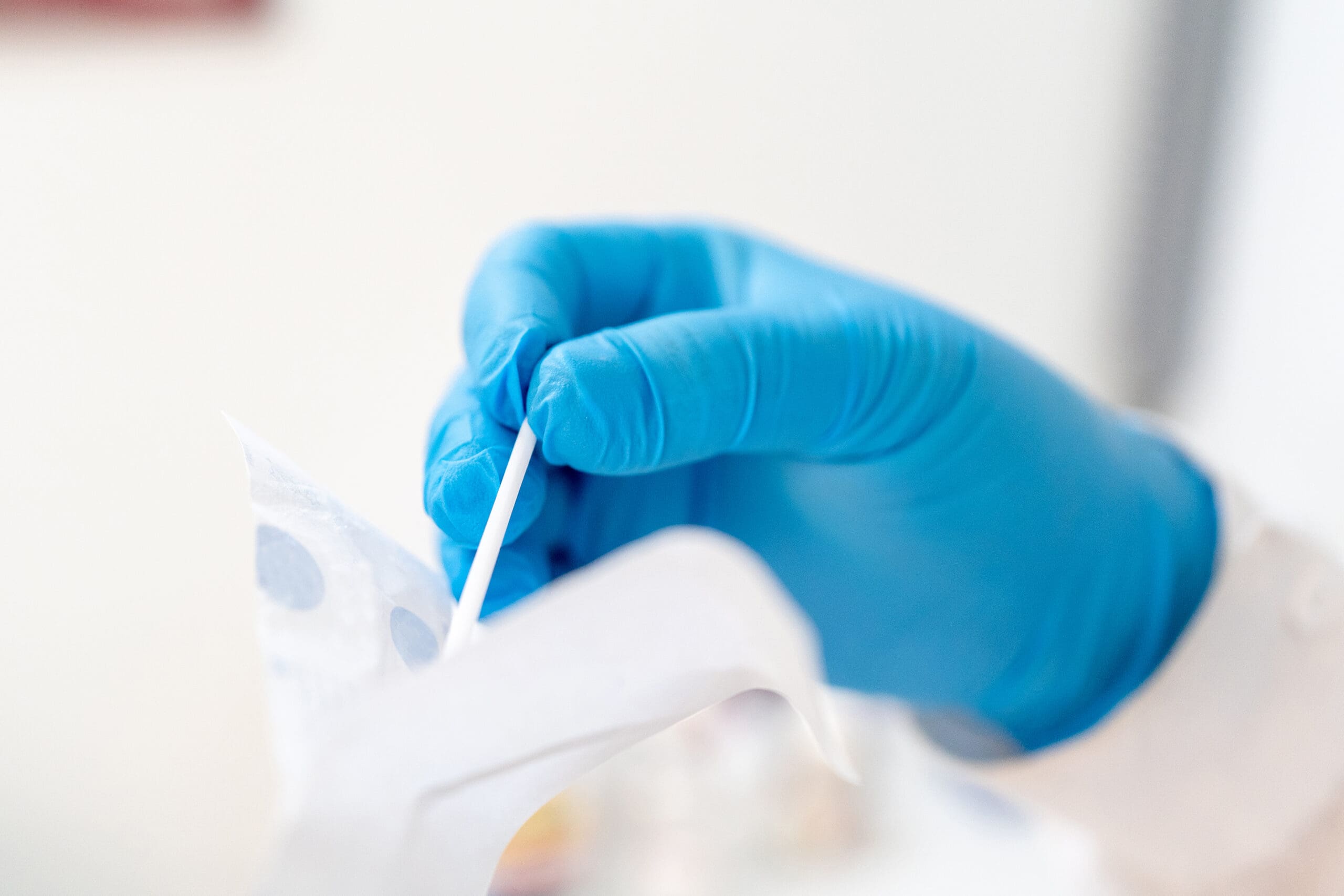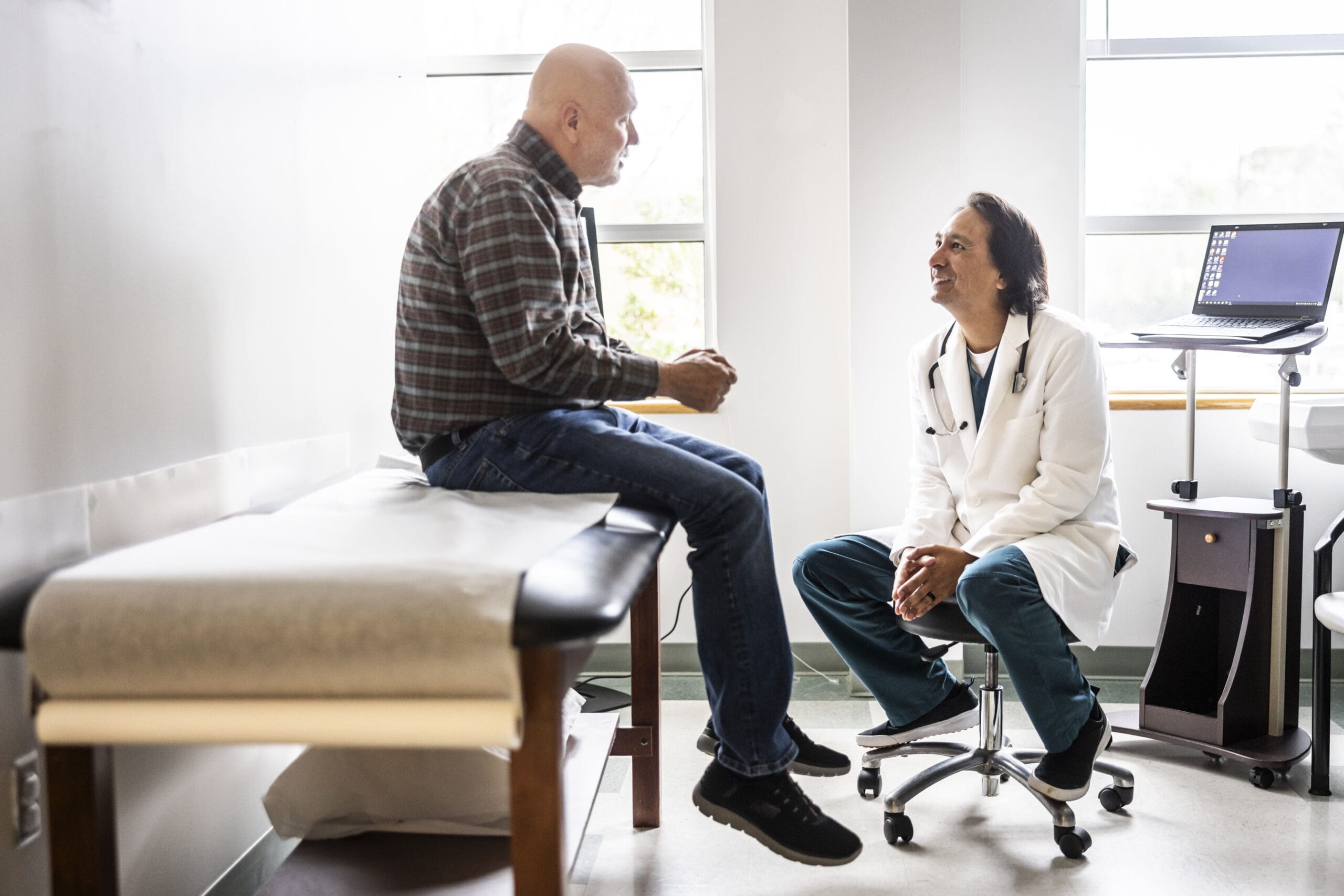
Prostate Cancer
Receiving a prostate cancer diagnosis can be a life-altering experience, and we understand the challenges you may be facing. At SCRI Oncology Partners, our compassionate oncologists bring decades of expertise in treating prostate cancer and we are here to support you every step of the way. Learn more about our team of experts and our innovative approach to cancer care.
Prostate cancer is a common condition among men. Although serious, early detection plays a crucial role, and with regular check-ups and screenings, many cases are caught early when they are most treatable. Advances in medical research and treatment options have significantly improved outcomes, allowing many men to lead healthy, fulfilling lives for many years.
Receiving a prostate cancer diagnosis can be a life-altering experience, and we understand the challenges you may be facing. At SCRI Oncology Partners, our compassionate oncologists bring decades of expertise in treating prostate cancer and we are here to support you every step of the way. Learn more about our team of experts and our innovative approach to cancer care.
Prostate cancer is a common condition among men. Although serious, early detection plays a crucial role, and with regular check-ups and screenings, many cases are caught early when they are most treatable. Advances in medical research and treatment options have significantly improved outcomes, allowing many men to lead healthy, fulfilling lives for many years.
Meet your Prostate Cancer Doctors



What are some of the signs and symptoms of prostate cancer?
The prostate is the organ that sits below the bladder and in front of the rectum – the last part of the intestines. It sits in front of the seminal vesicles, which are the glands that make most of the fluid for semen and where the urethra passes.
Because it usually grows very slowly, prostate cancer doesn’t tend to cause any symptoms until it’s at a more advanced stage. There are some types of prostate cancer, however, that grow aggressively and can spread quickly causing a sudden onset of symptoms.
Some common signs and symptoms you need to be aware of may include:
- Pain or burning sensation during urination
- Frequent or urgent need to urinate, particularly at night
- Difficulty starting urination, straining to empty the bladder or experiencing a weak, dribbling or interrupted urine flow
- Blood in the urine or semen
- Recent onset of erectile dysfunction (trouble getting an erection)
- Painful ejaculation
- Discomfort when sitting, often due to an enlarged prostate
- Weakness or numbness in the legs or feet
- Loss of bladder or bowel control
- Pain or pressure in the lower back, hips, testicles, rectum or pelvis
Many of these symptoms have causes other than prostate cancer, and many of those causes are benign. If you are experiencing a new or concerning symptom, however, it is important to tell your doctor so the cause can be found and treated as soon as possible.
Risk Factors
Staging
Treatment
Clinical Trials
How is prostate cancer diagnosed?
The process of receiving a prostate cancer diagnosis can be overwhelming, but it’s important to remember that you don’t have to face it alone. Our healthcare team is here to support you and guide you through the next steps.
Prostate cancer is typically diagnosed through routine screening, often before any symptoms have appeared. Early detection through screening, such as a digital rectal exam or a blood test to measure prostate-specific antigens (PSA), plays a crucial role in identifying potential issues. If your screening results raise concerns, your physician may recommend further testing, including a prostate biopsy, to confirm the diagnosis.
A biopsy is when a small piece of tissue is removed from the prostate and examined to see if it contains cancer cells, and additional tests might also be utilized to determine the Gleason score of the cancer cells. Other tools might be utilized in conjunction, including a transrectal ultrasound or magnetic resonance imaging. With the large number of tests involved in any diagnosis it is useful to find an oncologist near you to determine a cancer’s biomarkers and decide on the best treatment for you.

Risk factors for prostate cancer
Researchers have identified several factors that may increase a man’s risk of developing prostate cancer. While some of these risk factors cannot be changed, it is crucial to be aware of them and discuss them with your doctor. Being informed about your risk can help you make decisions about when to begin regular screenings and how to monitor your health proactively. Having one or more risk factors does not guarantee that you will develop prostate cancer, but it’s important to be aware if any of the following apply to you.
- Age is one of the most significant risk factors for prostate cancer. The likelihood of developing prostate cancer increases dramatically as men age, particularly after the age of 50. This makes regular screening especially important for older men to detect any early signs of the disease. Learn more about cancer screening guidelines.
- Race and ethnicity also play a crucial role in the risk of prostate cancer. Studies show that African American men and Caribbean men of African descent are more likely to develop prostate cancer and often at a younger age compared to other groups. Additionally, the cancer tends to be more aggressive or advanced in these populations.
- Family history is another key factor in the risk of prostate cancer. Men with a first-degree relative, such as a father or brother, who has had prostate cancer are twice as likely to develop the disease themselves. This risk increases even more if multiple relatives have been diagnosed. Additionally, inherited genetic mutations, such as those in the BRCA1 or BRCA2 genes, can increase the risk of prostate cancer, as can conditions like Lynch syndrome, which is linked to hereditary gene changes.
- Lifestyle factors also contribute to the risk of developing more aggressive forms of prostate cancer. Diets high in saturated fats, like those found in red meat and dairy, and low in fruits and vegetables can slightly elevate the risk. Obesity is another contributing factor, as is smoking tobacco, which, while not directly linked to an increased risk of developing prostate cancer, has been associated with a higher risk of dying from the disease. Thus, maintaining a healthy lifestyle can be an important aspect of reducing overall risk.
Types of prostate cancer
Most common prostate cancers are adenocarcinomas. There are two different types of adenocarcinoma of the prostate, acinar adenocarcinoma of the prostate and ductal adenocarcinoma of the prostate. The first develops in the gland cells that line the prostate gland and the latter in the cells that line the tubes (ducts) of the prostate gland. Ductal adenocarcinomas tend to grow and spread more quickly than acinar adenocarcinomas.
Most other types of prostate cancer are rare, but can include small cell carcinoma, transitional cell carcinoma, sarcomas and other neuroendocrine tumors (including large cell carcinoma).

Staging
Once you have been diagnosed with prostate cancer, your physician will determine the stage of your cancer to help guide your treatment plan.
Cancer staging refers to the process of determining the extent of cancer in the body, including the size of the tumor and whether it has spread to other areas. Prostate cancer is also given a grade, called a Gleason score, which describes how likely your cancer is to grow and spread. This information is combined to determine the stage of your cancer. Understanding the stage of cancer is crucial for your provider as it helps them assess the severity of the disease, plan the most effective treatment and identify suitable clinical trials that could be potential treatment options. Prostate cancer staging is quite complex. Don’t hesitate to discuss with your provider more to fully understand the state of your disease.
Stage I
- The tumor is half the size of the prostate or smaller, and the cancer cells are well-differentiated, which means they look like healthy cells.
- Men with cancer in this stage generally have low PSA levels and have a Gleason score of 6 or less.
Stage II
- The tumor is small and found only in the prostate but may have an increased risk of growth. PSA levels are medium.
- There are three different versions of Stage II cancers, labeled A, B, or C depending on their PSA levels, Gleason scores, and how differentiated the cancer cells are.
Stage III
- The tumor is characterized by high PSA levels, a growing tumor or a high grade. These cancers are more likely to grow and spread.
- Stage IIIA cancers have spread from the prostate to nearby tissues.
- Stage IIIB cancers have spread into nearby structures like the bladder or rectum.
- Stage IIIC cancer cells are poorly differentiated with a Gleason score of 9 or 10.
Stage IV
- The cancer spread outside of the prostate and may have any grade or level of PSA.
- Stage IVA cancers have spread to lymph nodes in the same region as the prostate.
- Stage IVB cancers have spread to distant lymph nodes, other parts of the body or to the bones.
How can prostate cancer be treated?
If you have been recently diagnosed with prostate, your cancer care team at SCRI Oncology Partners will work with you to develop a treatment plan that best fits your cancer, overall needs, and personal preferences.
Surgery
When prostate cancer is found early and hasn’t spread beyond the prostate, doctors often suggest surgery or radiation therapy as a treatment option. The most common type of surgery is called a radical prostatectomy. During this procedure, the entire prostate gland is removed, and occasionally some nearby tissue as well, to ensure all the cancer cells are taken care of. This approach helps to effectively treat the cancer and give you the best chance for a healthy future.
Radiation therapy
Radiation therapy may be used in combination with surgery or on is own to slow the growth of the cancer, treat symptoms or treat remaining cells. There are three main types of radiation therapy used for prostate cancer, external beam radiation and internal radiation.
Immunotherapy
One of the exciting new treatments for cancer in select patients is immunotherapy. This approach uses special drugs alongside other prostate cancer treatments to help your own immune system better recognize and fight off cancer cells. By working with specific proteins in your immune system, immunotherapy boosts your body’s natural defenses, making it even more effective at tackling cancer.
Hormone therapy
Hormone therapy, also known as androgen suppression therapy is another advanced treatment option. This method works by lowering the levels of male hormones that can encourage the growth of prostate cancer cells. It can be done either through surgery or with medications. While hormone therapy alone doesn’t cure prostate cancer, it can help to shrink the cancer or slow its growth, making it easier to manage and treat.
Chemotherapy
Chemotherapy is a helpful treatment option for prostate cancer, especially when the cancer has spread beyond the prostate gland and isn’t responding to hormone therapy. With chemotherapy, special anti-cancer drugs travel through your bloodstream to reach and target cancer cells wherever they might be in your body. This approach can be very effective in controlling the spread of cancer and improving your overall health.


Prostate cancer clinical trials
Today’s clinical trials are tomorrow’s treatment options. A clinical trial can help determine if a treatment, drug or procedure shows a better way of treating a particular cancer or condition. At SCRI Oncology Partners, we are committed to offering the latest clinical trials to improve your outcomes and ensure access to cutting-edge scientific advancements for our patients and the community.
If you are looking for a local oncologist in Nashville, Tennessee and are interested in participating in a clinical trial for prostate cancer through our collaboration with Sarah Cannon Research Institute (SCRI), a global leader in oncology research, the first step is to talk to our healthcare team.
We’re here to help, discover more resources from our Cancer Insights:

How to Detect Skin Cancer
Skin cancer is the most common form of cancer in the United States with more people being diagnosed each year than all other cancers combined. Knowing what to look for can help catch it early when it’s much easier to treat.

Six Must-Knows about Bladder Cancer
Bladder cancer is the fourth most common cancer diagnosed in men, and men are four times more likely than women to develop it.
We’re here when you need us
If you were recently diagnosed or would like a second opinion, request an appointment with one of our experienced cancer doctors right here in Nashville.
We’re here when you need us
If you were recently diagnosed or would like a second opinion, request an appointment with one of our experienced cancer doctors right here in Nashville.
We’re here when you need us
If you were recently diagnosed or would like a second opinion, request an appointment with one of our experienced cancer doctors right here in Nashville.

